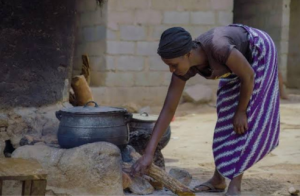Cooking Up Change: How Improved Cook Stoves Empower Women and Fight Energy Poverty

In many rural communities, the daily chore of cooking has long been a struggle—a challenge that not only consumes precious time but also poses serious health and environmental risks. At WEESI, we believe that every woman deserves the chance to lead a healthier, more productive life. Enter improved cook stoves—a simple innovation that’s transforming lives, one meal at a time.
A Day in the Life: The Story of Mama Lami
Imagine Mama Lami, a mother of three in a rural village. Every day, she spends countless hours preparing meals over a traditional open-fire stove. The thick smoke causes eye irritation and respiratory issues, while excessive firewood usage leads to deforestation and escalating fuel costs. Mama Lami’s struggle is a reality for many women who endure inefficient cooking methods at the expense of their health and well-being.
Then, one day, Mama Lami was introduced to an improved cook stove. Designed to be fuel-efficient and reduce smoke emissions, this stove significantly cuts her daily fuel consumption. with the use of charcoal briquette as efficient fuel. With a cleaner, safer cooking environment, Mama Lami now has extra time to invest in her family’s education and even explore small business opportunities. Her story is a testament to how renewable energy solutions can directly uplift women and break the cycle of energy poverty.
Why Improved Cook Stoves Matter
Improved cook stoves are more than just a technological upgrade—they are a lifeline for communities battling energy poverty. Here’s how they make a difference:
– Health Benefits: Reduced smoke emissions lower the risk of respiratory illnesses and eye irritation, ensuring a healthier life for women and their families.
– Economic Savings: With better fuel efficiency, households spend less on firewood, freeing up resources for education, healthcare, and other essentials.
– Environmental Impact: By decreasing fuel consumption, these stoves help preserve local forests and reduce carbon emissions.
-Empowerment Through Time: With less time spent gathering fuel or dealing with health issues, women gain time to pursue education, training, or entrepreneurial ventures.
Empowering Women Through Sustainable Solutions
At WEESI, our mission is to empower women by introducing sustainable energy solutions that make a tangible difference. Improved cook stoves are a clear example of how renewable energy can combat energy poverty while enhancing quality of life. We work closely with communities and local partners to ensure these stoves are not only distributed but also maintained, providing lasting benefits for generations to come.
By integrating improved cook stoves into everyday life, we help women reclaim valuable time, reduce health risks, and foster economic opportunities. This simple innovation is paving the way for a more sustainable future, where women lead the charge in transforming their communities.
And though this might look like a game changer for just the women in rural areas, but it is also very helpful to we living urban, have you seen the price of gas recently in Nigeria?
Join the Movement
Every time a woman like Mama Lami embraces an improved cook stove, she takes a step toward a brighter, healthier future. We invite you to join us in this movement for change. Whether you’re a community leader, a policymaker, or simply a supporter of women’s empowerment, your involvement can help light the way toward sustainable development and energy equity.
Together, we can cook up change—empowering women, protecting our planet, and creating a legacy of resilience and hope.
References
Global Alliance for Clean Cookstoves. Why Clean Cooking Matters. https://www.cleancookstoves.org.
United Nations Environment Programme. (2018). Clean Cooking Solutions. https://www.unenvironment.org.
International Energy Agency. (2020). Energy Access Outlook 2020. https://www.iea.org.
Sustainable Energy for All. (2021). The Role of Clean Cooking in Achieving Sustainable Energy for All. https://www.seforall.org.
World Bank. (2019). Clean Cooking and Energy Efficiency. https://www.worldbank.org
